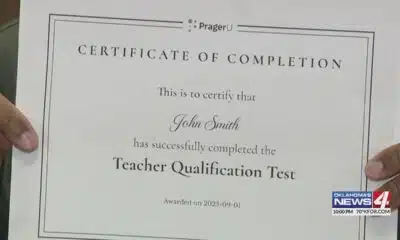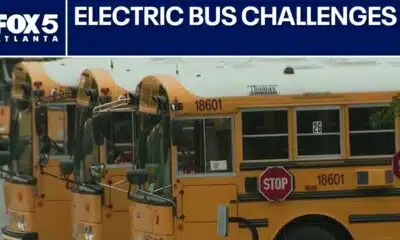News from the South - Florida News Feed
Florida Legislature’s 2025 Session: wins and losses
by Florida Phoenix staff, Florida Phoenix
May 3, 2025
A session that started under the lingering shadow of a bitter yet short-lived argument over immigration came sputtering to an end Friday with no agreement on a new state budget, the one bill the Legislature is constitutionally obliged to pass.
Senate President Ben Albritton and House Speaker Daniel Perez on Friday announced an extended session with lawmakers slated to return to Tallahassee on May 12.
Acrimony over Senate President Ben Albritton and House Speaker Daniel Perez’s inability to reach an accord spilled over from fiscal to substantive policy, with snits breaking out in a number of areas. The Senate’s proposed state fiscal year 2025-26 budget is $117.3 billion.
The House’s proposed FY 25-26 budget is $112.9 billion.
In the past few days, legislators did pass some high-profile bills, including measures designed to mitigate a crisis for condominium owners and set up new guardrails against developments in state parks – that one a rebuff to Gov. Ron DeSantis. Last summer, his administration briefly considered a plan to establish golf courses and hotels at several state parks but retreated in a hail of public outrage.
The Republican-controlled Florida Legislature also approved a bill that will make it more difficult for citizen-led constitutional amendments to make it on the ballot.
“This is the most important bill that we will be hearing in this chamber,” said Democratic Senate Leader Lori Berman on Wednesday. “And as you’ve heard, it’s going to greatly restrict the access of the citizens of the state of Florida to be able to address the system.”
The Legislature agreed to eliminate a 35-year ban that prevented some people from pursuing wrongful-death lawsuits against physicians and hospitals, a top priority for Perez.
Lawmakers, during the last week of session, agreed to roll back a law passed in 2023 that would’ve forced schools to push back their start times in 2026, leaving the decision up to schools.
Legislators filed 1,951 bills for consideration during the 2025 session. As of Friday, just 243 had passed, a Senate bill report showed.
Here’s a list of some of the bills that didn’t make it through the session.
Working and the economy
Rural Renaissance: SB 110 is a top priority for Albritton. It steers infrastructure investments to rural parts of the state. Despite unanimous support in the upper chamber, the House did not take it up during the 60 days lawmakers were in town. Instead, the $200 million bill will be a topic when lawmakers reconvene in the coming weeks.
E-Verify: DeSantis has repeatedly lambasted the House this session, stating that the chamber opposed everything he supports. But the House passed one piece of legislation DeSantis has pushed for, to require all employers to use the E-Verify system to check that new hires can legally work in the country.
However, the Senate never took up bills that would have brought thousands in penalties for employers who hire people unauthorized to work. Under existing law, only public agencies, their contractors, and companies with more than 25 employees have to use E-Verify.
“I’m sure he’s gonna be pretty upset that the Senate isn’t willing to move on E-Verify,” Perez told reporters on April 24.
Employment: Florida voters went to the polls in 2020 to raise the minimum wage ultimately to $15 an hour by 2026, yet a proposal by Lee County Republican Sen. Jonathan Martin (SB 676) called for certain workers to “voluntarily” agree to work for below the minimum wage in work-study, internship, or apprenticeship programs.
The proposal passed through two committees in the Senate before being temporarily postponed on April 16, and it never came back — something Albritton was fine with.
“I don’t love it, to tell you the truth,” Albritton told reporters last month. “I think if someone works, whether they’re being an apprentice or whatever, the minimum wage is in the [state] Constitution for a reason.” When asked at the time whether the measure was dead for the session, he said, “I would expect so.”
Lawmakers have bounced around reducing protections for young Floridians in the workforce, including allowing them to work overnight and full-time hours during school weeks.
Orlando Weekly reported that the bill was pushed by the DeSantis administration. The Senate bill, SB 918, did not make it to a second committee, while the House passed a version of the bill, HB 1225, off the floor last week that would keep overnight hours during the school year off limits for young people. The bill died.
Property insurance: The House inserted an amendment awarding attorney’s fees to the winning party in insurance litigation into a Senate bill extending (SB 832) new legal protections to phosphate mining companies. Still, the Senate refused to move forward on the changes amid heavy pushback from DeSantis, insurance companies, and the state’s insurance regulator. The bill died on Friday after the Senate took out from it the property insurance provisions.
Albritton told reporters on Monday that he believed in the changes lawmakers enacted in 2022 and 2023 to discourage lawsuits that insurance companies blamed for high rates were working.
“It’s only been a couple years, maybe. We’re still wanting to make sure we’re watching very closely what that is yielding,” Albritton said. “You’re right, there’s lots of new capital coming into the state. There’s new companies, rates are beginning to bend down pretty well, which is good news.”
The Office of Insurance Regulation reported an 0.7% drop in insurance costs in the fourth quarter of 2024. Twelve insurance companies have entered the state’s market, according to an announcement from the Office of Insurance Regulation on April 7.
Education
Baby Olivia: The chambers were at odds over mandated viewing of the “Baby Olivia” video to teach embryologic development to public school students. That provision was included in HB 1255, one of the bills lawmakers battled on until the end of session.
Seeking agreement from the Senate, the House removed the Baby Olivia language Friday night. What’s left of the bill requires parental consent for schools that use corporal punishment.
Various bills to put university presidential searches into the sunshine and remove Board of Governors involvement in those searches never made it to the finish line.
Meanwhile, in his budget proposal, DeSantis proposed transferring the Ringling Museum from Florida State University to New College of Florida, his evolving “Hillsdale College of the South.” That proposal has gone nowhere in the Legislature so far, with stakeholders from the museum organizing against such a transfer.
Health
Parental consent: Exceptions that protect minors’ privacy with health care providers will remain in Florida statute. Senators didn’t take a final vote on a bill (HB 1505) requiring minors to obtain parental consent before receiving treatment for sexually transmitted infections and diseases. The bill also would have removed a provision letting physicians prescribe birth control to a minor if their medical opinion is that the patient would suffer health hazards otherwise.
In the proposal’s last committee stop in the Senate, Stuart Republican Sen. Gayle Harrell teared up while she talked about her late husband’s work as an OBGYN treating young women.
“He would roll over in his grave right now. I’m a no,” she said on April 21.
THC products: One of the biggest fails of the session has to be the Legislature’s inability to regulate hemp-derived THC products for the third year in a row.
Perez assembled a 24-member workgroup that began meeting during the first week of session to “gain knowledge and understanding of the subject matter.” They came up with two main conclusions – that they didn’t want to do anything that might kill what has emerged as a billion-dollar industry in the state, but they also determined to change the status quo of how the product is being regulated – or not being regulated – in Florida.
The bills in the Senate sponsored by Polk County Republican Sen. Colleen Burton and in the House by Panhandle Republican Michelle Salzman did have some significant differences, which apparently in the end were too great. That’s despite the fact that those measures were approved unanimously in all committees that heard them.
“We will continue to debate how hemp affects public health and our economy,” Salzman told the Phoenix. “There are legal gaps we need to address in the future and I look forward to working with my colleagues to ensure these products are safe and protect consumers, while still allowing Florida farmers to thrive.”
Politics and law
Sovereign immunity: Rep. Fiona McFarland once again has fallen short in her efforts to increase sovereign immunity limits for people injured by the government or its political subdivisions. Her bill, HB 301, never saw movement in the Florida Senate, which stood firm against it.
“I’m very disappointed,” McFarland told the Florida Phoenix Friday. She promised she’d sponsor the bill during the 2026 session.
No fault repeal/PIP: The Florida House also championed legislation (HB 1181) to repeal the state’s no-fault automobile insurance laws and replace them with a fault-based system. It was one of several pieces of legislation the House advanced this session that would allow for more litigation, prompting Insurance and Banking Committee member Rep. Mike Caruso to opine, “Maybe we should call this the Insurance and Trial Attorneys Subcommittee because I feel like we’re doing a lot just for the benefit of trial attorneys.” The Senate agreed and never advanced the bill. DeSantis had already vetoed a PIP repeal once and opposed this year’s effort. The Senate companion (SB 1256) was never considered.
Wrongful death of fetuses: For a second year in a row, a bill (HB 1517) creating a legal avenue for parents to claim damages in the wrongful death of a fetus at any stage of development didn’t make it out of the session. This time around, the House approved the proposal, which reproductive rights advocates warned would establish fetal personhood.
Culture and Society
Guns: For the third year in a row, the Florida House voted to repeal the provision of the Marjory Stoneman Douglas Public High School Act that raised the age to purchase a long gun in Florida from 18 to 21. And for the third year in a row, the Florida Senate opted not to move a companion measure.
Just as disappointing for Second Amendment advocates is that another year went by without the Legislature allowing Floridians to openly carry firearms. Once dubbed the “Gunshine State” for being at the forefront of such pro-gun laws as “Stand Your Ground,” gun-rights groups and Gov. Ron DeSantis himself called earlier this year for Florida to join the other 45 states that allow for “open carry.”
But that legislation went nowhere in either chamber this year. Senate President Albritton made it known well before the session started that he was “super consistent” in standing with law enforcement, which, in the case of the Florida Sheriffs Association, has consistently as an organization opposed that policy change.
And a proposal that would have extended concealed-carry rights to Florida colleges and universities (SB 814), filed by now-former Brevard County GOP Sen. Randy Fine, failed in committee, with Miami-Dade Republican Ileana Garcia joining three Democrats to reject the measure. The shootings at Florida State University last month didn’t help the cause.
Hands-free driving: Florida was behind the curve when it finally voted in 2019 law banning texting while driving. With widespread complaints that the way that law was written makes it essentially unenforceable, there’s been a push in the past few sessions for Florida to join the now 30 states with bans on handheld cellphones in autos, according to the Governors Highway Safety Association.
Southeast Republican Sen. Erin Grall’s proposal along these lines passed the full Senate on April 9. Its House companion, however, filed by Democrat Allison Tant, was never debated in either of the two committees it was assigned to this year.
Finally, SB 110, dubbed the Rural Renaissance, a top priority for Albritton, would steer infrastructure investments to rural parts of the state. Despite unanimous would support in the upper chamber, the House did not take it up during the 60 days lawmakers were in town. Instead, the $200 million bill will be a topic when lawmakers reconvene in the coming weeks.
YOU MAKE OUR WORK POSSIBLE.
Florida Phoenix is part of States Newsroom, a nonprofit news network supported by grants and a coalition of donors as a 501c(3) public charity. Florida Phoenix maintains editorial independence. Contact Editor Michael Moline for questions: info@floridaphoenix.com.
The post Florida Legislature’s 2025 Session: wins and losses appeared first on floridaphoenix.com
Note: The following A.I. based commentary is not part of the original article, reproduced above, but is offered in the hopes that it will promote greater media literacy and critical thinking, by making any potential bias more visible to the reader –Staff Editor.
Political Bias Rating: Center-Left
The article provides a detailed, factual account of the Florida legislative session, focusing on the bills that were passed, those that failed, and key political disputes. While it highlights certain challenges and criticisms—such as those surrounding Gov. Ron DeSantis’ proposals and the GOP-controlled legislature’s internal conflicts—it maintains a neutral stance in its reporting. However, the inclusion of critical language toward conservative policies, such as the opposition to certain pro-gun measures and the rollback of protections for young workers, along with the mention of the controversial stance on cannabis regulation, subtly leans towards a more progressive or Center-Left perspective. The piece highlights significant partisan divides but refrains from overtly advocating for one side. Thus, the bias appears minimal but leans toward a Center-Left viewpoint in tone and framing of certain issues.
News from the South - Florida News Feed
Rudy Giuliani leaves the hospital after being injured in a car crash in New Hampshire
SUMMARY: Rudy Giuliani, 81, was released from the hospital after a car accident in New Hampshire where the vehicle he was in was struck from behind on Interstate 93. Giuliani sustained a fractured thoracic vertebra, multiple lacerations, contusions, and injuries to his left arm and leg. He and the driver, spokesman Ted Goodman, were helping a woman who reported a domestic violence incident when the crash occurred. Both suffered non-life-threatening injuries. The crash’s cause is under investigation, with no charges filed. Giuliani, known as “America’s mayor” for his 9/11 leadership, later served as Trump’s personal attorney, involved in controversial election fraud claims.
The post Rudy Giuliani leaves the hospital after being injured in a car crash in New Hampshire appeared first on www.news4jax.com
News from the South - Florida News Feed
Polls to open in Florida Senate, House special elections. How to find out if you should be voting
SUMMARY: Election Day in west Orange County, Florida, on Tuesday features special elections to fill two Florida Legislature vacancies in Senate District 15 and House District 40. Senate District 15 includes northwest Orange County areas like Winter Garden and College Park. The seat was vacated by the late Sen. Geraldine Thompson. Democratic State Rep. Bracy Davis faces Republican Willie J. Montague for the Senate seat. In House District 40, RaShon Young, Davis’ former chief of staff, won the Democratic primary and will compete against Republican Tuan Le and write-in Chris Hall in the Sept. 2 general election. Polls open 7 a.m.–7 p.m.; vote-by-mail ballots are due by 7 p.m.
The post Polls to open in Florida Senate, House special elections. How to find out if you should be voting appeared first on www.clickorlando.com
News from the South - Florida News Feed
Here’s what we know about COVID shots in Florida
SUMMARY: In Florida, confusion grows over COVID-19 vaccine access. Jen, a Tampa resident with an underlying condition, struggles to find vaccination sites despite consistent annual shots. Pharmacies like CVS now require prescriptions for vaccines in 16 states, including Florida, while Walgreens limits availability. The FDA approved the 2025/26 vaccine mainly for those 65+, requiring high-risk younger individuals to have prescriptions. Florida Surgeon General Dr. Joseph Ladapo opposes the vaccine, calling it unsafe. This hesitancy contrasts federal messages supporting choice, as CDC advisory meetings may soon clarify guidelines amid politicized debates. Many Floridians remain uncertain about vaccine availability and eligibility.
The post Here’s what we know about COVID shots in Florida appeared first on www.tampabay28.com
-
Mississippi Today2 days ago
DEI, campus culture wars spark early battle between likely GOP rivals for governor in Mississippi
-
Mississippi Today6 days ago
Judge: Felony disenfranchisement a factor in ruling on Mississippi Supreme Court districts
-
News from the South - North Carolina News Feed5 days ago
Parasocial party: Why people are excited for the Taylor Swift, Travis Kelce engagement
-
News from the South - Louisiana News Feed5 days ago
K+20: Katrina alters local health care landscape, though underlying ills still the same
-
Our Mississippi Home7 days ago
Katrina Remembered: A Hattiesburg Perspective
-
Mississippi News Video7 days ago
Today’s First Alert Weather Kid is Karson (8/26)
-
Local News7 days ago
Parents of missing 7-month-old California boy are charged with murder
-
Our Mississippi Home6 days ago
The Great Backyard Recovery – Helping Birds After the Storm









































